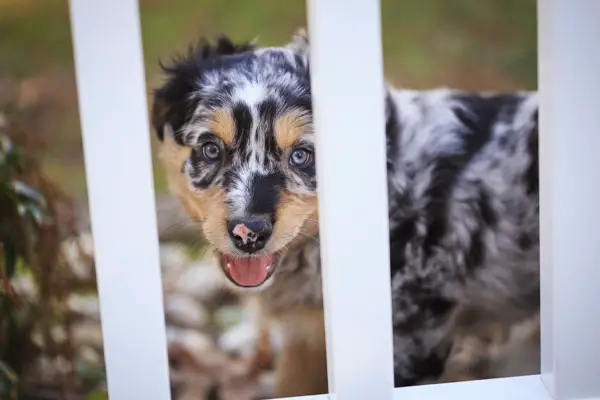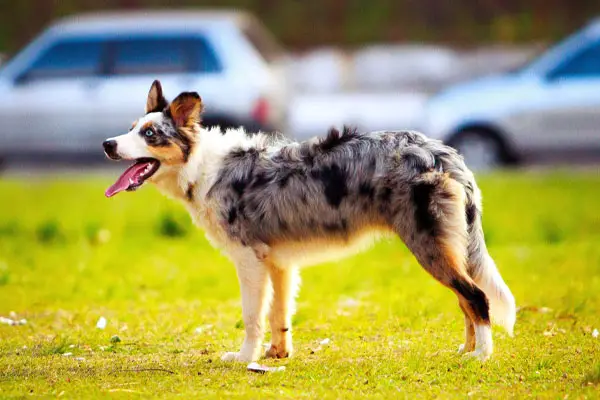The Australian Shepherd, or Aussies in short, is known as the cowboy’s herding dog of choice. They are medium-sized dog breeds that feature a striking merle coat that comes in blue, red, black, or red. Most of them also come with two beautiful eye colors, which a lot of people adore.
They are highly energetic who enjoy working and sports activities such as agility, flyball, herding, or tracking. They are very intelligent and are one of the smartest dog breeds. If you are not careful, they can easily outsmart you.

Australian Shepherd Statistics
| Dog Breed Group | Herding |
| Breed Size | Medium |
| Height | 20-23 inches (male); 18-21 inches (female) |
| Weight | 50-65 pounds (male); 40-55 pounds (female) |
| Lifespan | 12-14 years |
Australian Shepherd Ratings
| Energy level | |
| Exercise needs | |
| Requires attention | |
| Playfulness | |
| Trainability | |
| Shedding | |
| Grooming | |
| Friendly with family | |
| Friendly with kids | |
| Friendly with strangers | |
| Friendly with other dogs | |
| Prey Drive |
Related Article: Best Dog Food for Australian Shepherd
History Of The Australian Shepherd
Despite their name, Australian Shepherds did not originate from Australia. It was believed that Australian Shepherds came from the Basque Regions of Spain. The indigenous people in this region have been world-class shepherds for centuries. Their herding dog, the Pyrenean Shepherd, is believed to be the ancestor of the modern Aussie.
It was in the 1800s when these Basque people brought these dogs to Australia. During this time, the Australian continent started booming for its fertile pasturelands for cattle ranching, and the Basque Shepherds wanted to try their luck in herding. From Spain, the Basques traveled to Australia with their shepherd dogs.
Throughout the years, during their stay in Australia, they started refining the Pyrenean Shepherd dog breed to adapt to their needs in a new continent. They started crossbreeding it with British imports like Collies and Border Collies. When they finally got what they were looking for, the Basques left Australia for a greener pasture in California.
The Californian people immediately fell in love with Basques herding dog. Thinking they were from Australia, they named the dog breed, Australian Shepherd.
So, in America, the Australian Shepherds’ popularity continued to rise, especially with the cowboys. While some Aussies continued herding, most started showing their talents in rodeo and horse shows. Other than that, they became useful service dogs as they are very versatile – therapy dogs, drug dogs, search and rescue dogs – you name it, the Aussies got it.
Australian Shepherd Temperament
According to the American Kennel Club, Australian Shepherds are smart, work-oriented, and exuberant. They are working dogs, and love having responsibilities or something to do.
Aussies also have this dominant nature where they can be pushy. They also love exhibiting this dominance with other dogs. They need someone firm and confident to act as his leader so he can follow through. If you’re the timid type or a first-time dog owner, then this attitude might be something you’ll find hard to control.
Another thing you’ll notice is they have a massive amount of extra energy to spend. They need exercise – physical and mental. You can create several activities that you can do with him daily. Activities such as walking, running, frisbee, and fetch are things you can do to help him fight off boredom. When Aussies aren’t able to do anything, their destructive nature might show.
They make excellent family dogs, and would undoubtedly demand attention from you. Therefore they are best fit for those who don’t stay out often, or with someone who loves to travel and would take him along. However, if you have kids, don’t leave them with the Aussies as these dogs sometimes tend to herd children as well.
Early socialization and the right training will prevent the bad temperament of the Aussies from showing. Also, it’s best to see the parents, so you will know what possible attitude you want to watch out.
They are very intelligent and excel in any competition if well trained and taken care of properly. They’re not a breed for anyone, but for those who think they are a fit, the Aussies will surely brighten up your day.

Australian Shepherd Care Requirements
- Nutrition: Australian Shepherds, just like any other dog, require a high-quality diet. It should be rich in protein. However, don’t also forget the balance of fatty acids and a supplement of carbohydrates and fiber. This will help supply the energy he needs and also maintain his healthy coat. It doesn’t matter if you’re serving your Aussie a commercial food (dry and wet) or homemade. The important thing is that it must only contain high-quality ingredients. Don’t also forget to avoid by-products and grain-free dog food. These are not healthy options.
- Grooming: Australian Shepherds have a waterproof, double layer coat hair that needs a once a week brushing to maintain its healthiness. However, if it’s shedding season, then you will need to do more. Usually, you might need to do it daily, but this is better than having to clean up dog hair from furniture. As they are playful and energetic, occasional bathing might be needed depending on the activity he does. If he’s not always dirty, then frequent bathing would not be required. Don’t forget to always check the ears and clean them. The same goes for their nails – check those regularly and trim if needed.
- Exercise: Australian Shepherds are working dogs, and they are used to having a lot to do. Not doing anything can trigger their destructive behavior, which is why daily exercise is needed. You would need to satisfy their physical and mental needs. So, aside from doing the daily walks, both of you can play games too, such as fetch or frisbee. If you’re going the extra mile, then you can go out for a bike, run, or hikes. You can also let them join on some dog sports such as obedience, herding, and agility. You can do anything just to give Aussies a purpose. This is why they’re perfect companions for those who love adventures and are highly-energetic too.
- Health: Australian Shepherds are also prone to several health problems, just like any other dog breed. One of the most common is hip dysplasia, which is a malformation in the hip socket of the dog. The problem here is symptoms don’t manifest immediately, and dogs may appear normal. But in the long run, they develop arthritis. Aussies are also prone to eye problems such as colobomas, cataracts, progressive retinal atrophy, and detached retinas. Multiple Drug Sensitivity is common too, which can be fatal if they’re injected with veterinary drugs that they’re allergic to. Early screening tests are essential. Other common dog problems you can also watch out for are epilepsy, parasites, and cancer. The best thing you can do as a dog owner is to take your dog to a vet for check-ups. If there are screening tests available, then you can do that as well.
- Lifespan: The life expectancy of Australian Shepherds is 12-15 years.

Famous Australian Shepherds
- Bunk: The Australian Shepherd side-kick of cowboy star Jack Hoxie
- Magic: An Australian Shepherd dog owned by Peter Bloeme, a canine disc expert
- Stub and Shortie: Australian Shepherd dogs that starred in a Disney film
- “Run, Appaloosa, Run” and “Stub: Best Cow Dog in the West”
- Hyper Hank: A Frisbee Champion in the 1970s
Fun Facts About Australian Shepherds
- They are not from Australia; they came from the Basque region of Spain.
- Australian Shepherds became famous because of their frequent participation in rodeos.
- Native Americans regard Australian Shepherds as sacred dogs, mainly because of their “ghost eyes.”
- They often have two-colored eyes or a condition called heterochromia.
- Australian Shepherds have many jobs – herding dogs, guide dogs, drug dogs, search and rescue dogs.
Check Out Other Herding Dog Breeds:
Australian Cattle Dog, Bearded Collies, Beaucerons, Belgian Malinois, Belgian Sheepdog, Belgian Tervuren, Bergamasco Sheepdog, Berger Picards, Border Collie, Bouviers des Flandres, Briards, Canaan Dog, Cardigan Welsh Corgis, Collie, Entlebucher Mountain Dogs, Finnish Lapphund, German Shepard, Miniature American Shepherd, Norwegian Buhunds, Old English Sheepdog, Pembroke Welsh Corgi, Polish Lowland Sheepdogs, Puli, Pumi, Pyrenean Shepherd, Shetland Sheepdog, Spanish Water Dog, Swedish Vallhunds
